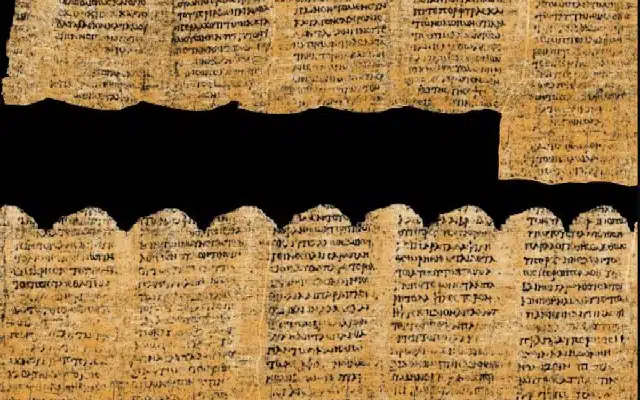Washington: Three scholars were honored with a $700,000 award this week for their pioneering use of artificial intelligence in deciphering a 2,000-year-old scroll ravaged by the eruption of Mount Vesuvius.
The Herculaneum papyri, a collection of around 800 Greek scrolls, were carbonized in the volcanic catastrophe of 79 CE, which obliterated the ancient Roman town of Pompeii. These scrolls, resembling charred logs, have long posed a challenge due to their extensive damage, crumbling, and illegible text.
In a groundbreaking initiative known as the “Vesuvius Challenge,” high-resolution CT scans were conducted on four scrolls, with a total prize pool of one million dollars offered to incentivize research. The winning team, comprising Youssef Nader, a PhD student from Berlin, Luke Farritor, a student and SpaceX intern from Nebraska, and Julian Schilliger, a Swiss robotics student, utilized AI to identify ink patterns on papyrus and decipher faint Greek text.
Robert Fowler, a classicist and chair of the Herculaneum Society, lauded the potential significance of these discoveries, suggesting they could reshape understanding of pivotal periods in ancient history.
The challenge required researchers to decode four passages, with a minimum of 85 percent of characters recoverable. Last year, Farritor made a breakthrough by uncovering the first word of one scroll, revealing it to be the Greek term for “purple.”
While their efforts have decoded only five percent of the scroll so far, there is hope for further progress. The scrolls are believed to be authored by the Epicurean philosopher Philodemus, covering topics such as music, food, and the pursuit of pleasure.
Discovered in a villa thought to have belonged to Julius Caesar’s father-in-law, the scrolls hint at the existence of a potentially vast library yet to be unearthed.
The competition was conceived by Brent Seales, a computer scientist at the University of Kentucky, and Nat Friedman, the founder of GitHub. According to Friedman, the recovery of these ancient texts could herald a significant breakthrough, given the scarcity of surviving ancient Greek manuscripts.
Federica Nicolardi from the University of Naples Federico II described the endeavor as the start of a revolution in Herculaneum papyrology and Greek philosophy. Friedman revealed that the next phase of the competition aims to unlock 85 percent of the scroll using the insights gained from current research.
Read More:




